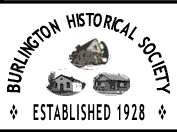|
Burlington Historian -
June 2014
| Celebration of the
100th Anniversary of Burlingtonís Lincoln Statue
On Sunday, May 18, one of the nicest days of the
spring, the Historical Society and City of Burlington hosted about 140
people at the celebration of the 100th anniversary of Burlingtonís Lincoln
Statue. The crowd included descendants of Mrs. Antoinette Meinh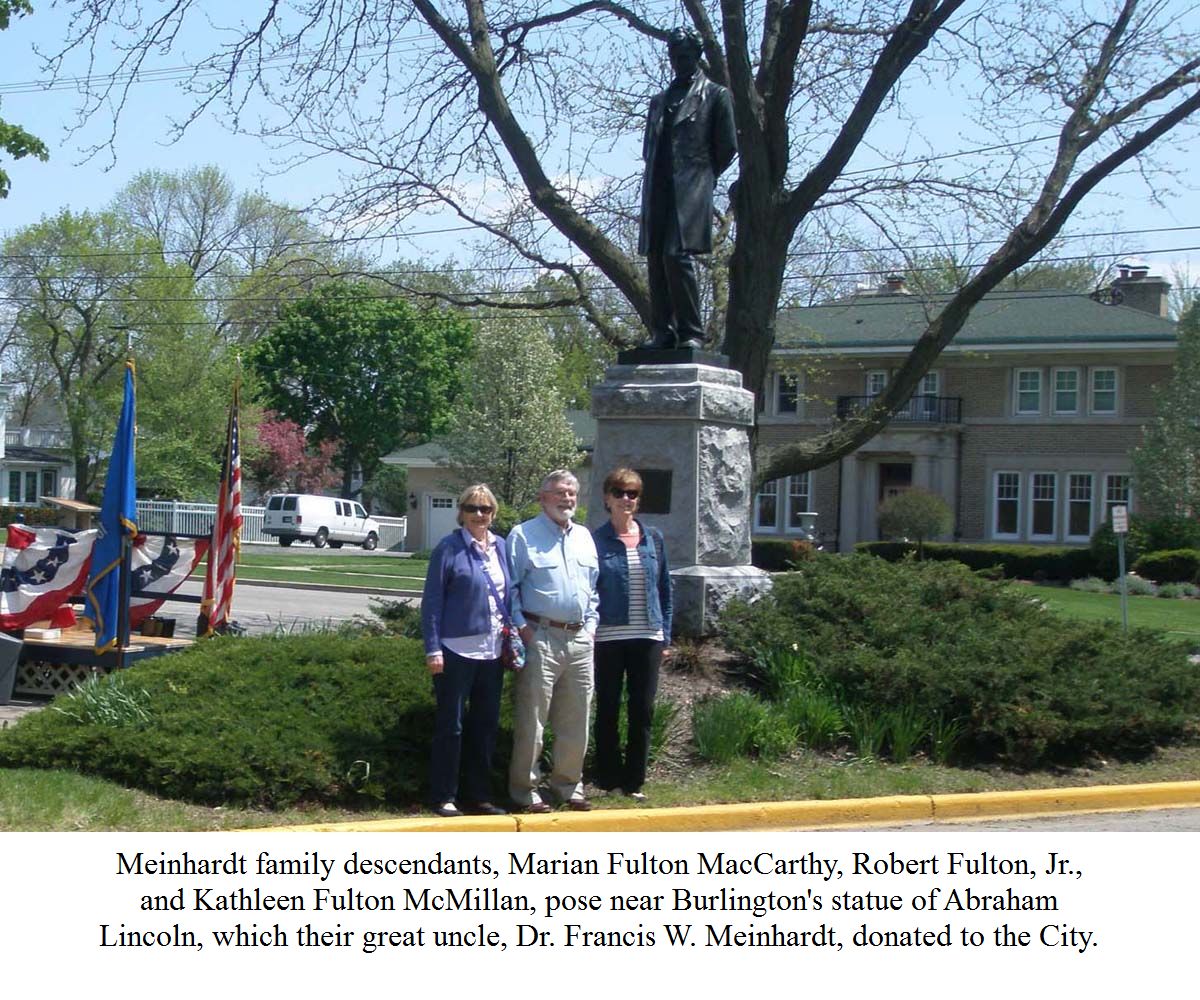 ardt
Fulton, whose brother, Dr. Francis W. Meinhardt, donated the statue to
Burlington. The statue, sculpted by George Etienne Ganiere and depicting
Lincoln at the time of his Second Inaugural Address, was first unveiled in
an impressive ceremony in October 1913. ardt
Fulton, whose brother, Dr. Francis W. Meinhardt, donated the statue to
Burlington. The statue, sculpted by George Etienne Ganiere and depicting
Lincoln at the time of his Second Inaugural Address, was first unveiled in
an impressive ceremony in October 1913.
The program, with Society president Dennis
Tully as master of ceremonies, opened with the posting of the colors by an
honor guard comprised of members of several Burlington veteransí groups and
the singing of the Star-Spangled Banner led by Burlington High School
student Micah Gebel.
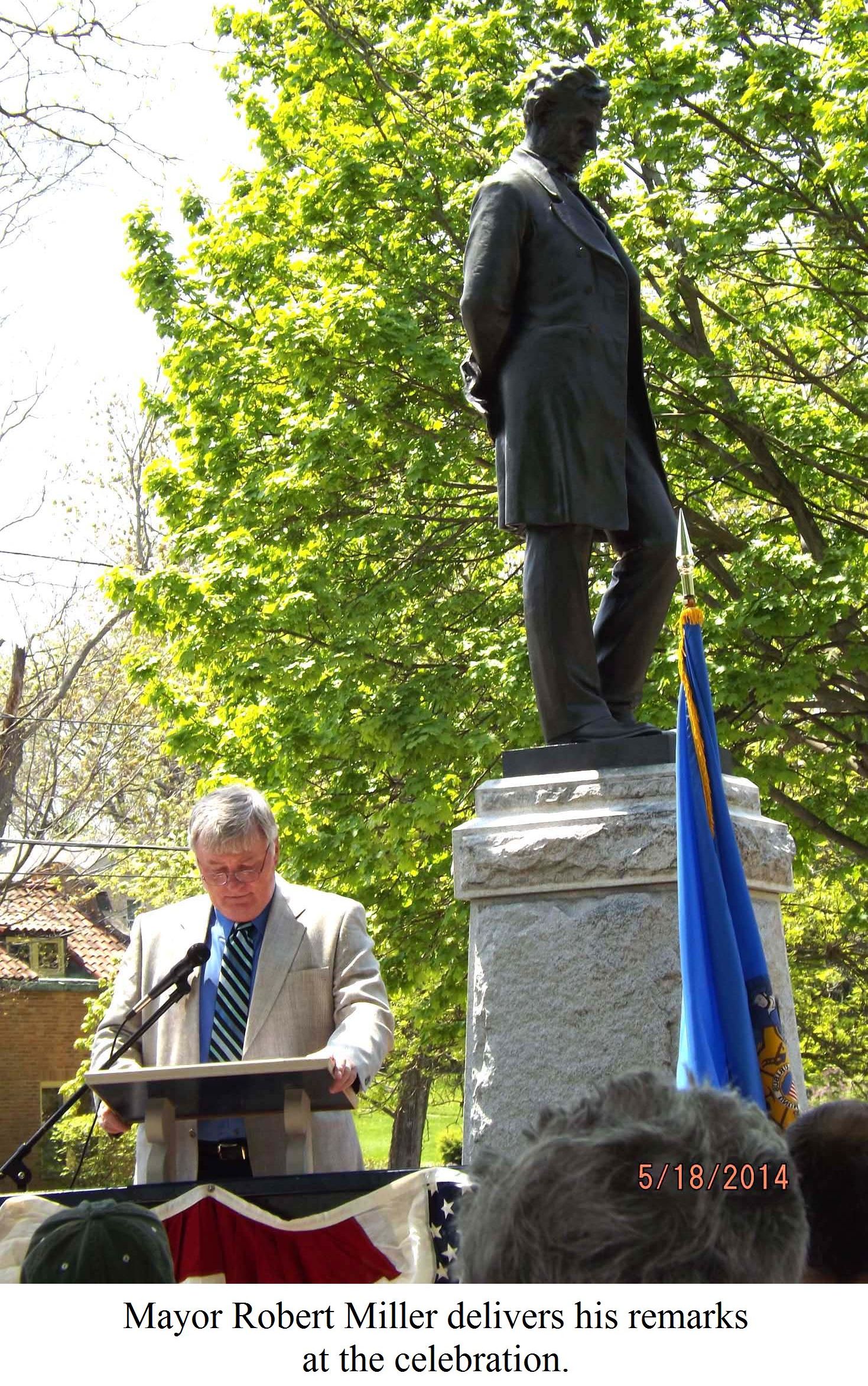 Mayor
Robert Miller welcomed the attendees and provided a number of facts about
Lincolnís life, some of which many may not have known or did not remember. Mayor
Robert Miller welcomed the attendees and provided a number of facts about
Lincolnís life, some of which many may not have known or did not remember.
The master of ceremonies then introduced another Burlington High School
student, Karley Nadolski, who read excerpts from Lincolnís Second Inaugural
Address. Prior to the reading, Mr. Tully provided information on the setting
in which Lincoln made his remarks.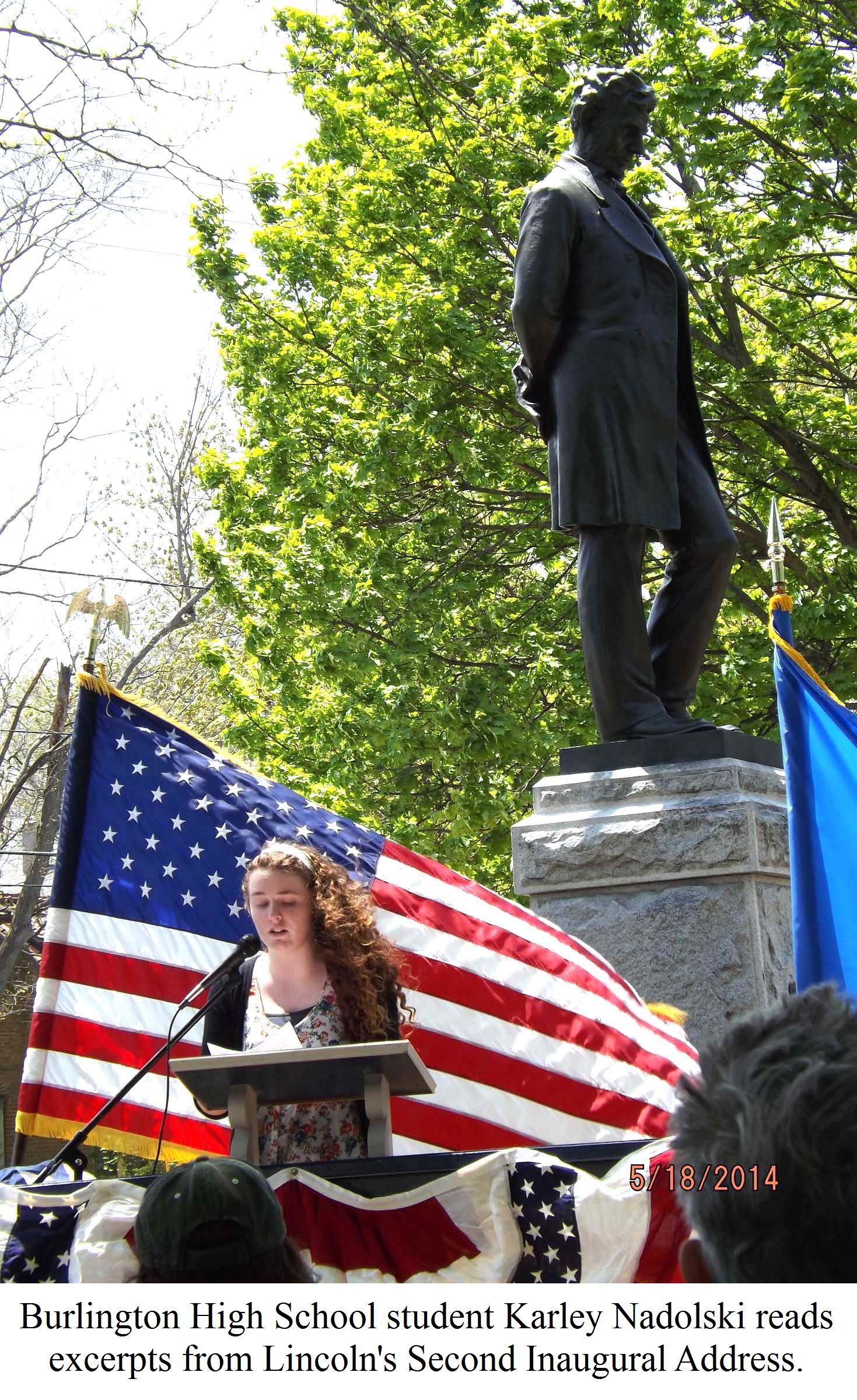
Ms. Nadolski gave voice to one of Lincolnís most powerful and memorable
speeches, second only, perhaps, to his Gettysburg Address. In the Second
Inaugural, Lincoln said that he trusted that the progress of the war was
reasonably satisfactory and encouraging to all. He expressed high hope for
the future, but ventured no prediction on it.
Pointing to slavery as the basic reason for
the war, Lincoln explained the situation in which the country found itself
at the start of the war. He said that both parties deprecated war; but one
of them would make war rather than let the nation survive; and the other
would accept war rather than let it perish. And the war came.
With the end of the war in sight, Lincoln ended his address saying:
"With malice toward none; with charity for all; with firmness in the right,
as God gives us to see the right, let us strive on to finish the work we are
in; to bind up the nationís wounds; to care for him who shall have borne the
battle, and for his widow, and his orphan Ė to do all which may achieve and
cherish a just and lasting peace, among ourselves, and with all nations."
Lincoln scholar Steven Rogstad, of Racine, then delivered the main
address. He provided insight into President Lincolnís conduct of the Civil
War, the reasons for the actions Lincoln took to preserve the Union, and
Lincolnís thinking on re-incorporating the rebellious States into the Union.
Mr. Rogstad also made the point that Burlingtonís Lincoln Statue is
one-of-a-kind, noting that the agreement with Ganiere stipulated that no
copies ever be made.
Following Mr. Rogstadís speech, Ms. Gebel led the audience in singing
"The Battle Hymn of the Republic," after which the colors were retired.
Refreshments were then served.
|
(Photos by Ray Ziebell)
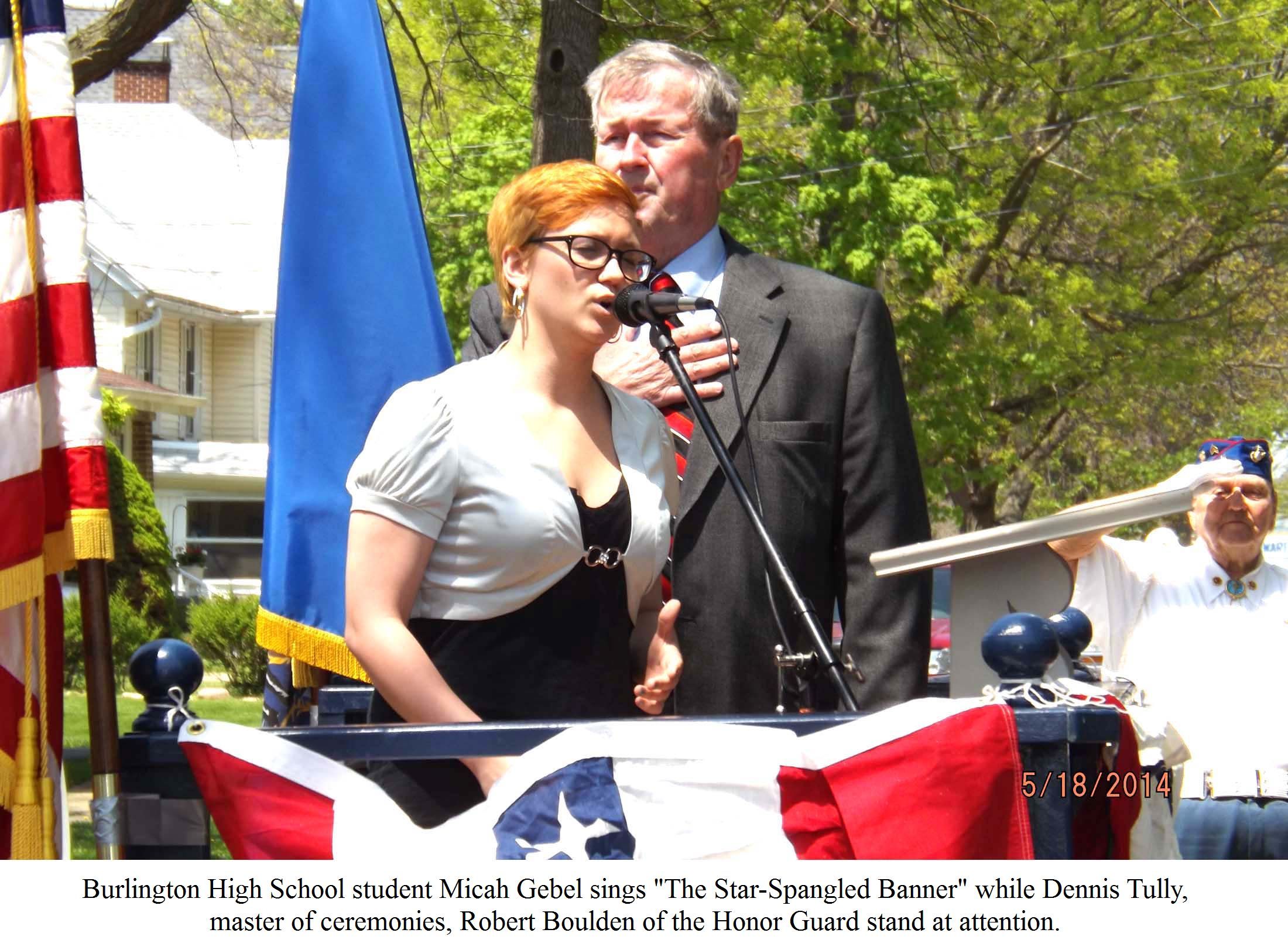
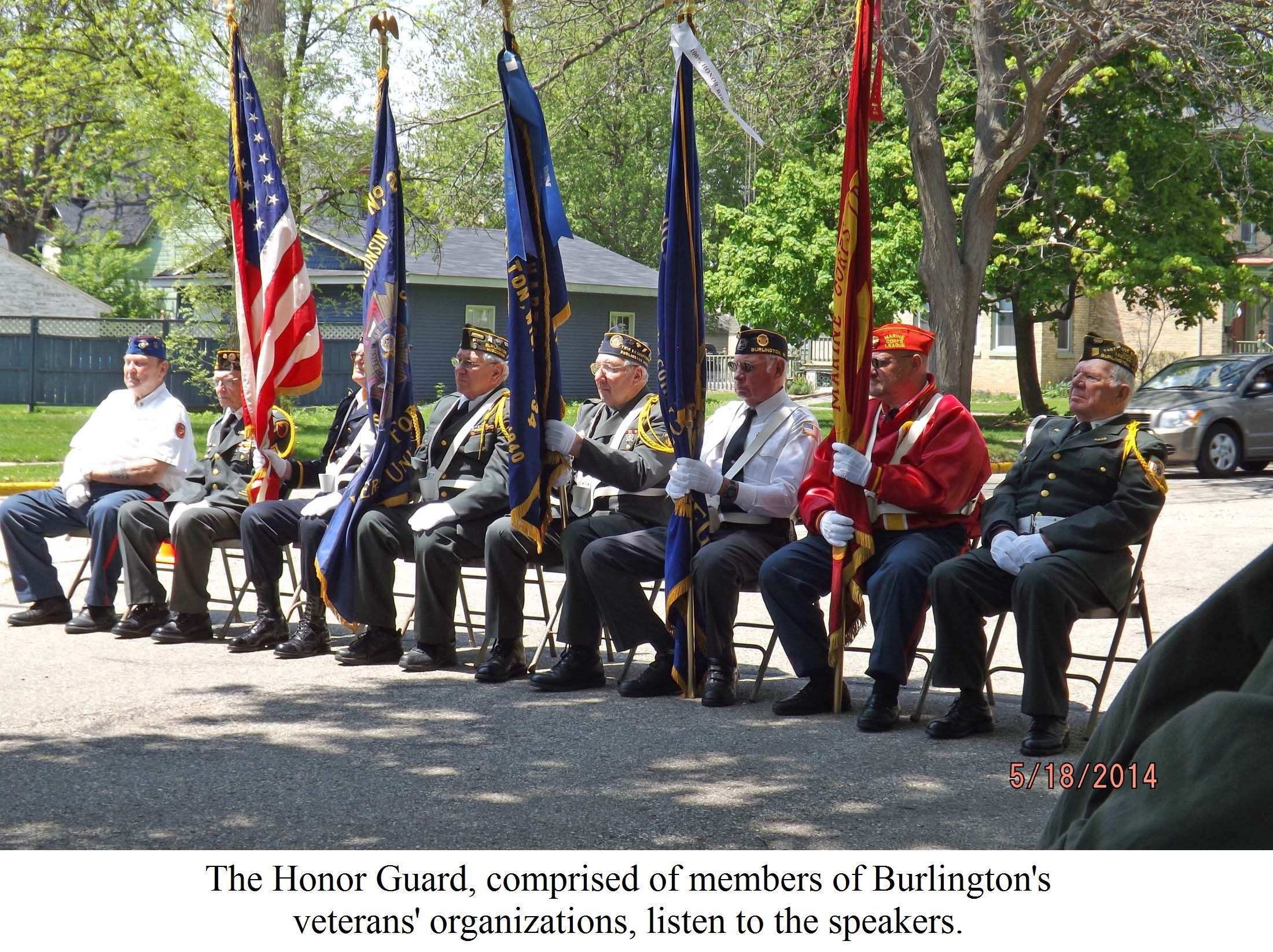
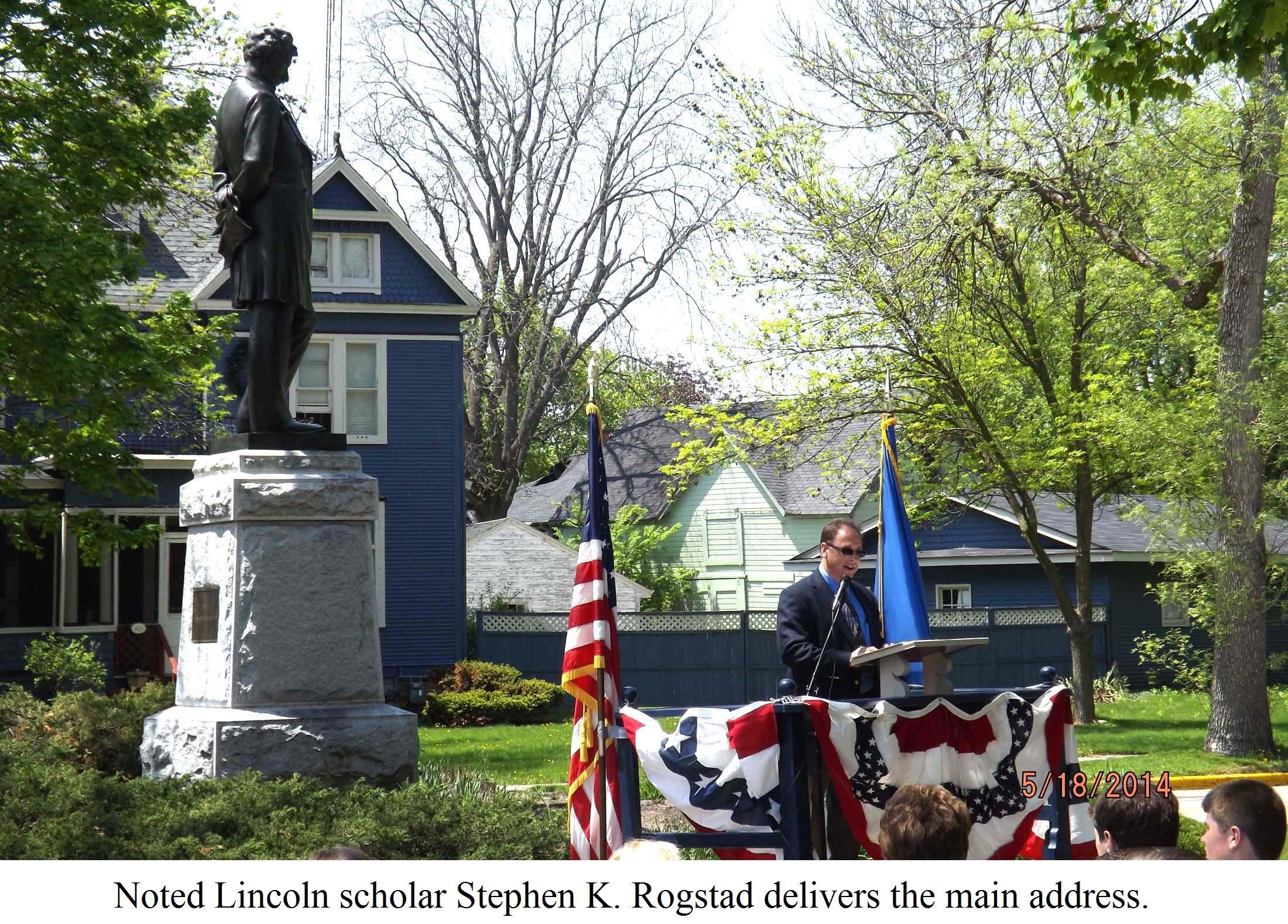 |
| Presidentís Message
Thanksgiving is the fourth Thursday of November Ė but why wait till then?
All of us have so much to be thankful for and donít realize what is
available. What a great day we had for our Lincoln statue anniversary
celebration and the turnout was also something to be proud of. Patriotism,
some think, is floundering these days. I donít think so. If one looks around
and sees what this country is made of, I think we all have great feelings
for the past and present and for the gifts that America has over many other
countries.
What a long wait we had to see our trees and flowers start popping out.
It should get us the energy to go out and about our great State of Wisconsin
and enjoy the many scenic and popular attractions that are in our "back
yard." Do a little homework and youíll find many activities and attractions
that we have to pick from. Itís fun to see other communitiesí ethnic and
historic events and learn of the customs and talents they have to offer.
We invite all to plan an hour or so on some
Sunday afternoon and visit our fine museum. The citizens of Burlington and
those with (and sometimes without) ties to the Burlington area have been so
generous over the years to donate many interesting and quality artifacts
from the past that fill our museum to the walls. I know our treasures will
bring back some fond memories of the days of past generations. Call some
friends and neighbors and stop in between 1 and 4 any Sunday afternoon.
Have a great summer.
Dennis Tully
|
|
An Early Pioneer of Burlington Writes of
Some of His Experiences
Joshua Spriggs, born in Northamptonshire, England, in 1834, came to
Burlington in 1848 with his father and stepmother, five brothers, a
sister, a halfsister, and a stepbrother and stepsister. The family lived
in Burlington for a year before moving to Dover township. In January 1898,
Mr. Spriggs wrote the following letter to the editor of the Standard
Democrat.
In the year 1848 a family left the isle of Albion, bound for the new
world. They took passage on a clipper ship at Liverpool, and after a long
and stormy voyage landed in the city of New York. After a short stay in that
city they came to Buffalo, by way of the Hudson river and Erie canal. From
Buffalo they took passage on a lake steamer and came to the city of Racine.
The head of the family was undecided where to locate, but after a short
stay in Racine he made the acquaintance of a member of the Perkins family,
of Burlington, who advised him to locate in the vicinity of Burlington and
offered to take him out there to see the country for himself. He took his
advice and liked the country so well that he moved his family to Burlington.
We found ourselves in a new world, but among kind-hearted people, who
done everything that lay in their power to make us comfortable and give us a
start in the land of our choice. All honor to the early pioneers of
Burlington! I wonder sometimes if the present generation ever think of them.
I wonder if they ever think how they braved the dangers of the wilderness
and made it possible for others to follow after. Many of them have gone over
the Great Divide, but their good deeds will live forever.
We found a small but thriving village. The mill was there but not the
present substantial building. There were several log houses along the river
bank below the mill, and a wooden bridge crossed the Fox river, which went
down with the floods the next spring. There were Indians in the village
dressed in their native costume and the river bank was their favorite
camping ground. But they, too, like the early pioneer, are gone.
When I visit your city at the present time I can scarcely realize the
great change that has taken place. I walk through your streets and look for
something that will remind me of the early days but I cannot find it. All is
either gone or changed so that it is scarcely recognizable. The buildings of
the old pioneers have been torn down and elegant structures now occupy their
sites.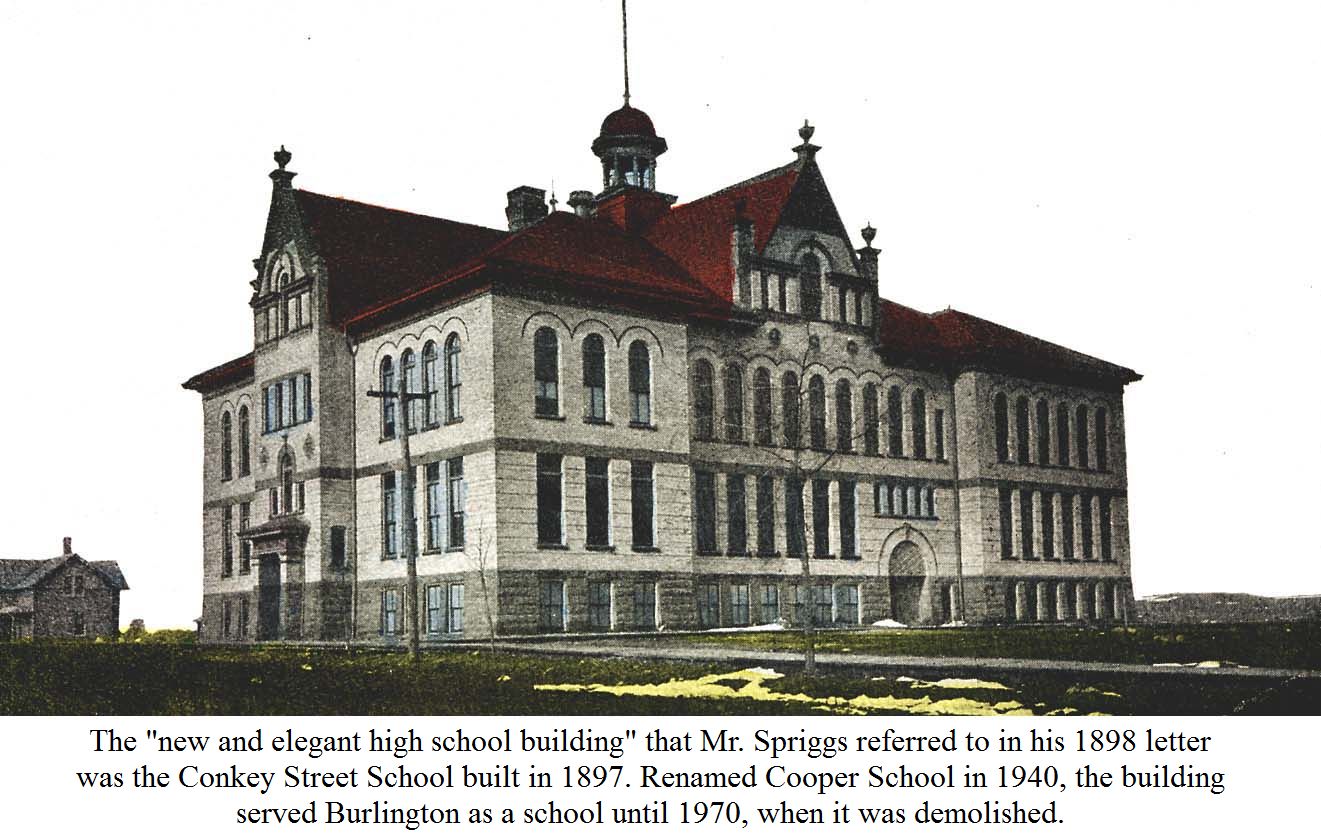
But I can still see the noble and honest faces of Grandfather
Perkins and Meinhardt as they were in í48, and many others who have passed
away. I see all the push and energy of the people in the eastern cities, and
I see the new man and the new woman. I see your new and elegant high school
building, which would be a credit to any city in the union, and I see your
beautiful and well kept suburban homes. And I also see your magnificent
churches which are as a beacon light to guide the traveler from this world
to that which is to come. It is always a pleasure for me to visit Burlington
for your highways are always good.
Along in the fifties I met a half-breed Indian on the road near town
going to the mill. He had a team of horses and four sacks of wheat in the
wagon. He was sitting on one sack and had a sack of wheat on his shoulder. I
asked him why he carried that sack on his shoulder. He said the road was so
bad he thought he would make it easier for his horses. Such a sight would
not be possible at the present time.
You have a beautiful city and a lovely country surrounding it. I have
traveled through many states and I have never seen but one place that I
could compare with the country surrounding Burlington and that was at
Woodland, California. When I looked around me I was reminded of the heaven
we had found in the so-called wild and wooly west.
Vive la Burlington; may you live long and prosper.
JOSHUA SPRIGGS
In October 1900 the Standard Democrat printed another piece by
Spriggs, who was then the paperís Central Dover correspondent. Spriggs
again reminisced about Burlington in 1848-49.
We visited our favorite city of Burlington the other day. Yes, it is a
flourishing city now, but when we landed there direct from Albionís fair
isle 52 years ago it was only a hamlet. There were a few small frame houses,
some cobble stone buildings and log cabins. Indians were walking in the
streets and hundreds more were in camp on the banks of the Fox and White
rivers.
How well I remember the spring of í49. There was a big flood in the Fox
and White rivers that year and one day myself and three brothers were on the
wooden bridge that spanned the Fox river. The water was up to the floor of
the bridge and huge cakes of ice were piled up against it.
We had never seen anything like it before and did not realize our danger,
when a boy of my acquaintance told us to leave the bridge. He was an
American and smart as a whip, while we were green as the grass that grows.
We refused to obey him and finally he came on the bridge and drove us off
telling us we would all be drowned if we did not leave. He saw that it could
not stand the strain much longer and in ten minutes after we left, the
bridge parted in the center and the whole structure went down stream.
I owe a debt of gratitude to that man and his family, for it was they who
encouraged and helped us to make a home in the new world. He is at rest now,
but his name stands high on the list of Burlingtonís most honored citizens,
and his good deeds live after him.
|
|
The "Ball" at Brass Ball Corners
From the Standard Democrat, February 14, 1936
Over 75 years ago Seth Huntoon hung a bright brass ball over the plank
road in front of his wayside inn. Most of the time since then there has been
a similar marker and Brass Ball corners is known to thousands of tourists.
The present ball was put up by George Huntoon, son of Seth, and is now
cared for by Roger Huntoon, son of George. Roger lives in a big gray house
at the road intersection.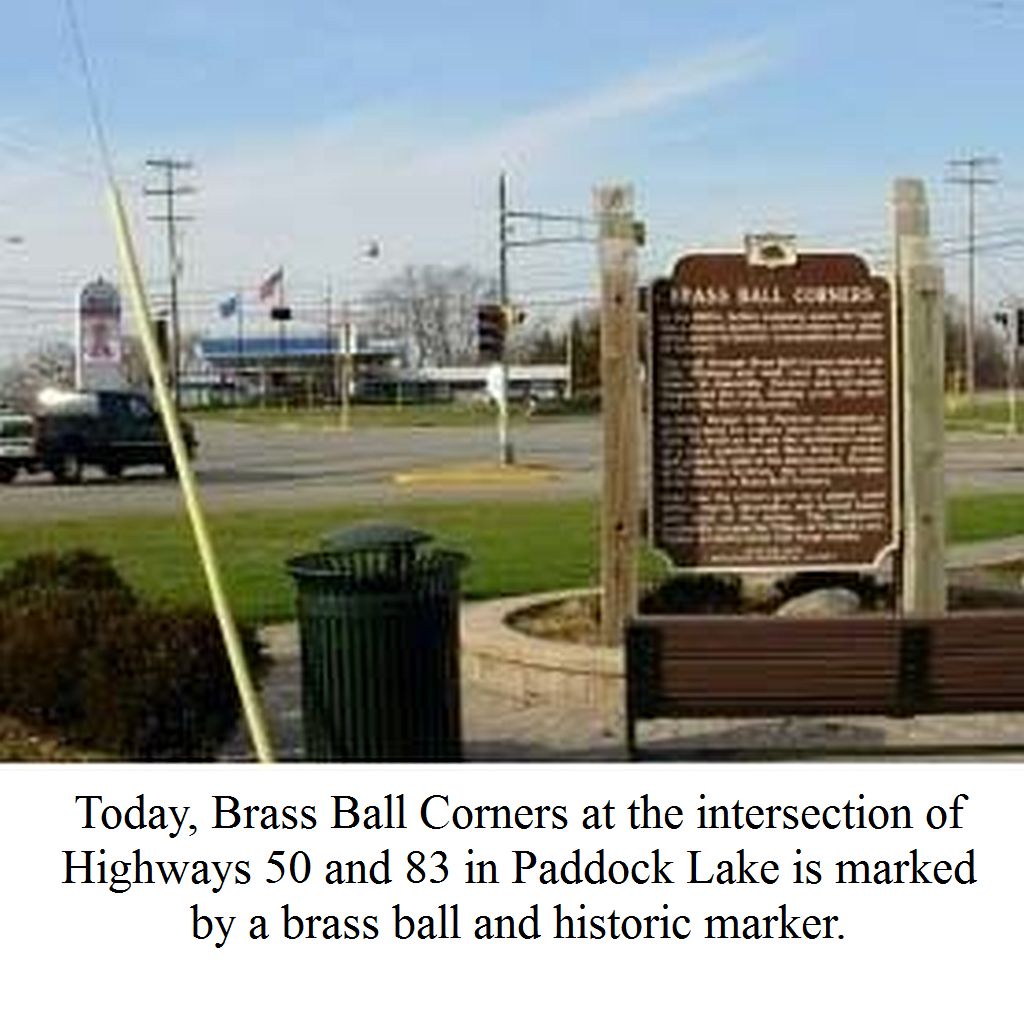
"Seth Huntoon put up the first ball at least 75 years ago," Roger said.
"He used to have a tavern on this spot, on the road from Kenosha to Lake
Geneva and on a plank road running to Silver Lake.
"That first ball was wood painted gold and thatís how it came to be
thought of as brass and his tavern was known as the Brass Ball tavern. There
was a lot of travel even in those days before the railroads and the ball
attracted a lot of people who were traveling by stage-coach.
"I donít know just when the original ball disappeared, but for quite a
few years there wasnít any marker on the corner.
"My father put the present one up there. It used to be a buoy for a mine.
It had worked ashore off the Florida coast and was found by Herman Molitor
of Kenosha, and he gave it to my father. The buoy is made of aluminum, so my
father had it gilded and put up in 1924. The electric company strung it up
for us."
Huntoon's "brass ball" is a landmark for miles around. When anyone stops
and asks for directions leading to the intersecting highways, he usually is
told to watch for the brass ball.
"I hear scores of tourists going by in cars say, ĎThereís the
ball,í or something like that," Huntoon said, "and quite a few stop and ask
for its history. They usually come right to our house, without knowing us,
because we're right here on the corner."
Huntoonís greatest trouble in maintaining the marker comes from young
mischief makers.
"The kids come along and throw stones at it," he complained. "Sometimes
we donít see them in time and they knock the paint off or dent it. Thatís
the trouble Ė some people donít care about such things. With us itís a
tradition." |
|
|
